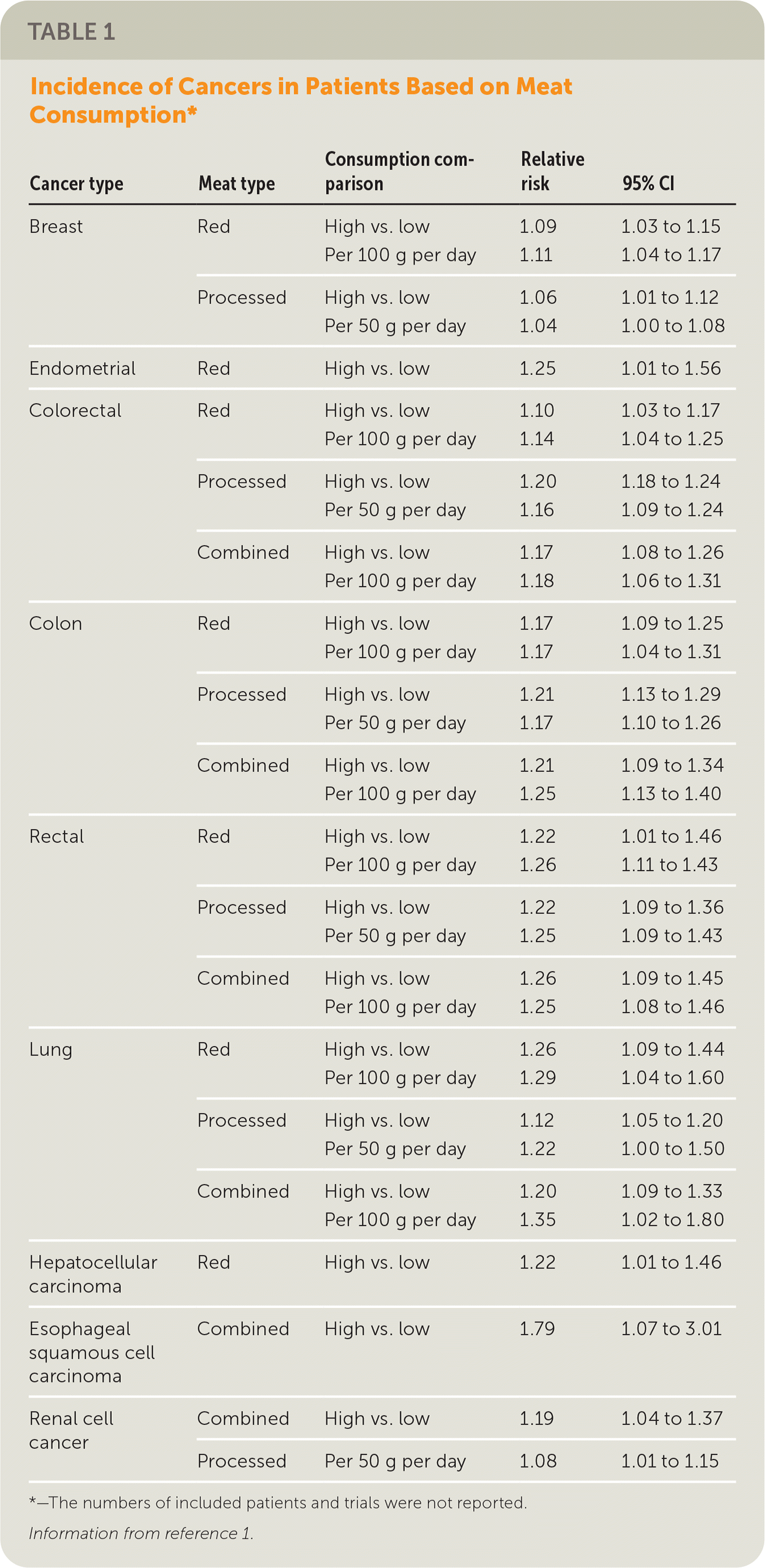
Am Fam Physician. 2023;107(4):424-425
Author disclosure: No relevant financial relationships.
Clinical Question
Does the consumption of red and processed meats increase the risk of cancer?
Evidence-Based Answer
Patients should consume less red and processed meat. Higher meat consumption increases the risk of breast, colorectal, colon, rectal, and lung cancers. (Strength of Recommendation [SOR]: A, meta-analysis of cohort, case-control, and randomized controlled trials.)
Evidence Summary
A 2021 meta-analysis evaluated 148 articles (128 cohort, 11 case-control, and nine randomized controlled trials) with more than 17 million patients that evaluated the association between the consumption of red and processed meats and the incidence of cancers after four to 27 years of follow-up.1 Patient demographics were not reported. The study included the following cancer types: breast, ovarian, endometrial, prostate, colorectal, stomach, esophageal, pancreatic, lung, bladder, renal cell, hepatocellular carcinoma, leukemia, non-Hodgkin lymphoma, melanoma, and glioma. The primary outcome assessed the incidence of cancer by comparing the highest vs. lowest consumption of red meat, processed meat, and combined red and processed meat, and the risk of cancer per 100 g per day of red, 50 g per day of processed, and 100 g per day of combined red and processed.
There was an increased risk of breast, endometrial, colorectal, colon, rectal, and lung cancers and hepatocellular carcinoma in patients with higher vs. lower red meat consumption (Table 11). Higher amounts of processed meat consumption were significantly associated with an increased risk of breast, colorectal, colon, rectal, and lung cancers. Higher amounts of red and processed meat consumption were significantly associated with an increased risk of colorectal, colon, rectal, and lung cancers, and esophageal squamous cell carcinoma. There was no association between meat intake and ovarian, prostate, stomach, and bladder cancers, esophageal adenocarcinoma, leukemia, non-Hodgkin lymphoma, melanoma, or glioma. The authors noted an increased risk of cancer per 100 g per day of red meat consumption for breast, colorectal, colon, rectal, and lung cancers. For every 50 g per day of processed red meat consumed, there was an increased risk of breast, colorectal, colon, rectal, lung, and renal cancers. There was a higher risk of the following cancers per 100 g per day of combined red and processed meats consumed: endometrial, colorectal, colon, rectal, and lung. Limitations of this meta-analysis include limited data on dose-response analysis.

| Cancer type | Meat type | Consumption comparison | Relative risk | 95% CI |
|---|---|---|---|---|
| Breast | Red | High vs. low | 1.09 | 1.03 to 1.15 |
| Per 100 g per day | 1.11 | 1.04 to 1.17 | ||
| Processed | High vs. low | 1.06 | 1.01 to 1.12 | |
| Per 50 g per day | 1.04 | 1.00 to 1.08 | ||
| Endometrial | Red | High vs. low | 1.25 | 1.01 to 1.56 |
| Colorectal | Red | High vs. low | 1.10 | 1.03 to 1.17 |
| Per 100 g per day | 1.14 | 1.04 to 1.25 | ||
| Processed | High vs. low | 1.20 | 1.18 to 1.24 | |
| Per 50 g per day | 1.16 | 1.09 to 1.24 | ||
| Combined | High vs. low | 1.17 | 1.08 to 1.26 | |
| Per 100 g per day | 1.18 | 1.06 to 1.31 | ||
| Colon | Red | High vs. low | 1.17 | 1.09 to 1.25 |
| Per 100 g per day | 1.17 | 1.04 to 1.31 | ||
| Processed | High vs. low | 1.21 | 1.13 to 1.29 | |
| Per 50 g per day | 1.17 | 1.10 to 1.26 | ||
| Combined | High vs. low | 1.21 | 1.09 to 1.34 | |
| Per 100 g per day | 1.25 | 1.13 to 1.40 | ||
| Rectal | Red | High vs. low | 1.22 | 1.01 to 1.46 |
| Per 100 g per day | 1.26 | 1.11 to 1.43 | ||
| Processed | High vs. low | 1.22 | 1.09 to 1.36 | |
| Per 50 g per day | 1.25 | 1.09 to 1.43 | ||
| Combined | High vs. low | 1.26 | 1.09 to 1.45 | |
| Per 100 g per day | 1.25 | 1.08 to 1.46 | ||
| Lung | Red | High vs. low | 1.26 | 1.09 to 1.44 |
| Per 100 g per day | 1.29 | 1.04 to 1.60 | ||
| Processed | High vs. low | 1.12 | 1.05 to 1.20 | |
| Per 50 g per day | 1.22 | 1.00 to 1.50 | ||
| Combined | High vs. low | 1.20 | 1.09 to 1.33 | |
| Per 100 g per day | 1.35 | 1.02 to 1.80 | ||
| Hepatocellular carcinoma | Red | High vs. low | 1.22 | 1.01 to 1.46 |
| Esophageal squamous cell carcinoma | Combined | High vs. low | 1.79 | 1.07 to 3.01 |
| Renal cell cancer | Combined | High vs. low | 1.19 | 1.04 to 1.37 |
| Processed | Per 50 g per day | 1.08 | 1.01 to 1.15 |
Recommendations From Others
The 2020 American Cancer Society guideline on diet and physical activity for cancer prevention recommends limiting or eliminating the consumption of red and processed meats for cancer prevention.2 (SOR: C, evidence-based guideline.) They define red meat as unprocessed meat from mammals and processed meat as meat transformed through curing, smoking, salting, fermentation, or other processes to improve preservation or enhance flavors, such as bacon, sausage, ham, bologna, hot dogs, and deli meats. The guidelines recommend following a healthy eating pattern at all ages, which limits or does not include red and processed meats. These guidelines are developed by a national panel of experts and reflect the most current evidence related to dietary and activity patterns and cancer risk.
